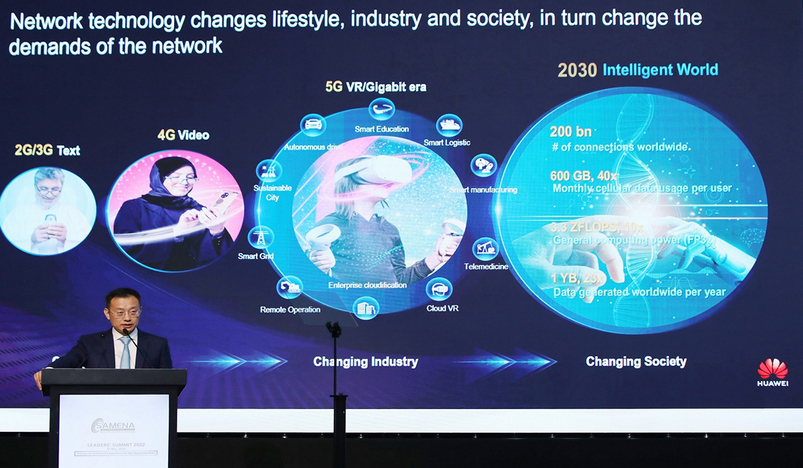
Huawei Highlights its Commitment to Technological Advances
Leaders and experts from the telecommunications industry came together at this year's SAMENA Council Leaders' Summit hosted by Huawei for the ninth consecutive year. The annual gathering was held under the theme of "Thriving with Resilience & Integration in the New Opportunity Realm" and focused on the new business opportunities that 5G and allied technologies provide for all industries and economic sectors.
This year, Huawei shed light on the role of 5G, cloud and digital power in tackling the sustainability needs of the telecom industry and how an integrated intelligent ICT architecture will light up the future. Through its 'Everything as a Service' model, Huawei highlighted the cloud's integral role in enabling the digital economy and data sovereignty. The Summit also focused on the opportunities gained by integrating technologies, infrastructure investment, connectivity, and spectrum availability, which will benefit vertical industries and economic sectors.
Steven Yi, President of Huawei Middle East, highlighted the crucial role of 5G in driving digital transformation across the region and the immense opportunities for enterprises in the 5G era. "Digital renaissance triggered by the pandemic has pivoted digital transformation to new heights, with 5G era infrastructure and communications technologies taking center stage. A strong drive for digital transformation is taking place worldwide, and Huawei is committed to bring the ingenious new technologies that will enrich people's lives with immersive digital services and enabling new opportunities in the industry’s digital transformation with smart digital solutions.” Yi noted.
Bocar A. BA, SAMENA Council CEO, said, "We held very fruitful discussions on the future direction of our networks, particularly in the 5G era. What was apparent is the transformational role of networks in driving digital transformation and economic growth. Participants also agreed that networks themselves must evolve to meet the region's sustainability goals. In this regard, the role of innovation in enabling net-zero transition through digital power technologies is increasingly important for the Middle East."
Vanness You, Vice President of Marketing and Solution, Huawei Middle East, officially launched Huawei IntelligentRAN in the region. Vanness You noted that: “Towards the future, intelligence in every industry and connection, Huawei IntelligentRAN opens new paths to wireless intelligence, bringing the next level of service capability including agile service, smart experience, smart green and smart O&M.”
Additionally, IntelligentRAN allows intelligent air interfaces to use key technologies like smart grids, scheduling dictionaries, and channel graphs. These tools can configure air interface resources intelligently and achieve optimal user experience and capacity. Service prediction with IntelligentRAN also guides non-real-time spectrum and channel selection on the network side and real-time symbol scheduling and transmit power configuration on the base station side. This significantly reduces energy consumption across the entire network.
Huawei Executives took part in several panel discussions. Mohamed Madkour, VP of Wireless Networks Marketing and Solutions at Huawei, participated in the "Leaders' Exchange Connectivity for the New Decade" panel. He noted that intelligent connectivity is the lifeline for everyone and integral to every country's digital economy. He reiterated Huawei's commitment to providing powerful, intelligent, simple and efficient digital infrastructure and operational tools to create more commercial and social values for societies, industries and economies. He also highlighted that growth oriented ICT policies are key to facilitate a favorable environment for business and technology innovations.
Emaad Ahmed, Chief Expert, Huawei Middle East, took part in a panel discussion titled "Techno-Business Convergence Achieving Sustainable Integration in the 5G Era." He noted that operators' OPEX increases due to system and network complexity. Therefore, reducing OPEX and achieving green development is essential for operators' future growth in light of the carbon-neutral background and the demand for cost reduction and increased efficiency.
Joined by senior executives from leading companies in the region, Mr. Paul M. Scanlan, CTO of Carrier Network Business Unit, Huawei, participated in "Cloud & Network Synergies: Achieving Resilience in Service Delivery" roundtable. The executives discussed Cloud Resilience, Hybrid-Cloud, Cloud Native Security, Multi-Cloud, Cybersecurity, Cloud Service Models, "X2B", Cloud and Network Synergies.
The Summit also witnessed the launch of a joint UNESCO Huawei report titled "Talent Ecosystem for Digital Transformation: Insight Report on ICT in Higher Education and TVET (Technical and Vocational Education) in the Middle East and Pakistan". The report echoed the importance of developing ICT talents and creating relevant ecosystems to enhance ICT skills in the region and expand access to career opportunities in the digital world. The report showed a focus on ICT skills development has resulted in high ICT skills among the populations in the region. Data shows that 79% of individuals in the UAE have basic ICT skills in 2019. The corresponding figure is 61% in Saudi Arabia and 63% in Bahrain. With a legacy of developing high-quality human capital, Jordan has 63% of individuals with basic ICT skills.
.jpg)
Qatar Secures Place Among the World's Top 10 Wealthiest Nations
.jpg)
Hamad International Airport Witnesses Record Increase in Passenger Traffic

Saudi Arabia: Any visa holder can now perform Umrah

What are Qatar's Labour Laws on Annual Leave?
Leave a comment